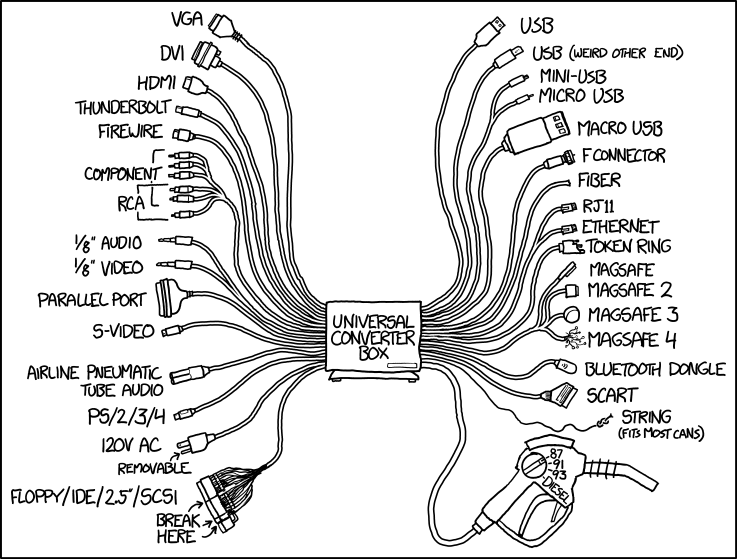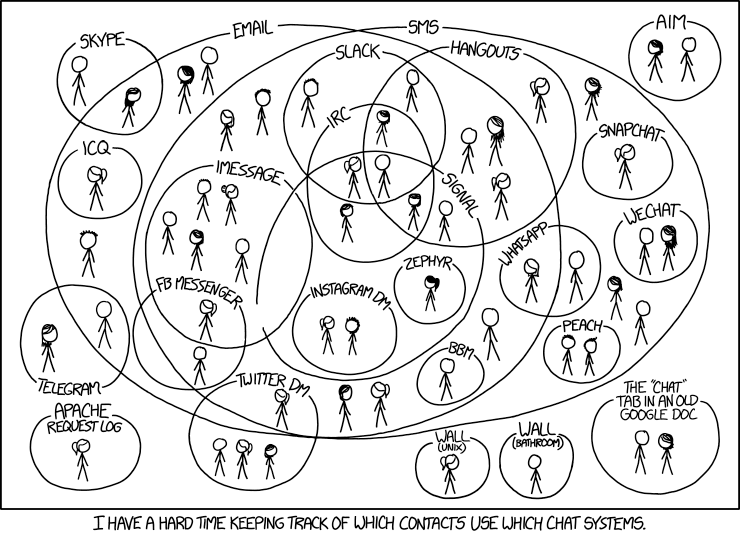Following on a previous post I have used 3 macbooks over the last month. The screen of 2011 macbook air died, and it was converted into my desktop at the new office (I am now with the University of Lisbon). Pretty much like Pedro Melo, I ordered a new Macbook Pro with Touchbar, but because I always max-out the RAM (blame dockers and VMs), I had a 3 week period with no laptop.
While I understand Apple’s desire to have 8GB as the default value for RAM due to energy consumption, it should not consider a custom model having 16GB on its high-end 13’‘ macbook pro. Luckily I unshelfed my dear 2007 black macbook to keep going to meetings and teach classes in the meanwhile. I would not spend 1000+ euros on a 8GB machine in 2017, let alone the 2000 they ask. On a side note, if I wasn’t expecting this new machine to last 5 years, I would have gone with the previous Retina Macbook, which was ~400 euros cheaper, with more or less the same specs. The main difference: USB-C.

When USB-A was introduced, it looked like a great solution. Specially because it was the only solution at the time and all vendors adopted it pretty quickly. Then over time, USB turned out to be 16 different things, which disappointed many users who had invested in USB-mini when USB-micro became the default (and EU) standard for phone chargers. Then there was 30-pin and lightning, thunderbolt 1 and 2.

I’ve decided to invest in USB-C, but I know the risks:
- It will take at least 5 years for old-style USB to go away in external devices (Think keyboards, mice, pen drives, external drives, and many other esoteric peripherals).
- I would have to spend money on dongles, either on duplicate or carry them with me at all times.
- Everything USB-C is more expensive, due to technology licensing.
- Within 5 years, USB-Z will probably be out and outdate everything USB-C, making my choice useless (what I call technological serendipity).
- USB-C is no standard, its a connector for several standards, such as Power transfer, Display-Port, Thunderbolt 3, PCIe, etc..
My main concert is the combination of the two latest. When someone buys a USB-C cable, they are making several decisions: does that cable include power? Thunderbolt? Displayport? Which version of Displayport? This cable nightmare is already here, and I fell for it. I ordered a USB-C to Thunderbolt2 adapter, hoping it would work with my mDP-HDMI, mDP-VGA and thunderbold2-ethernet adapters. But this adapter only works with Apple’s displays. The cable does not support miniDisplayPort at all! I had to return it.
Overall, I ordered the following adapters with my macbook pro:
- Apple USB-C to USB-C cable and Power adapter (came with the laptop).
- Apple USB-C to VGA+USB-A+USB-C to take with me for classes and presentations.
- Apple USB-C to HDMI+USB-A+USB-C for my home monitor, keyboard (which connects to my mouse), and power connector.
- Apple USB-C to USB-A because I always like to have one official connector for devices that need their own port (External USB-3 drives).
- Griffin Breaksafe – This replaces Apple’s cable for the power connection with magsafe-like capabilities. There are other brands with the same magnetic cable, but most of them have really low build quality. Even Griffin’s has connection problems (on the other USB-C side, connecting to the charger, not the magnetic connector). The end that connects to the macbook is really wide, which only allows for apple adapters on the adjacent port (this would suck if I have the non-touchbar version). I am not convinced with this cable, and I will only use it when I’m on the sofa or bed. By the way, it does not work with 15’‘ macbook pro.
- Dell WD1 dock with 2x USB2, 3x USB3, HDMI, mDP, VGA, Ethernet, Audio output and Audio in/output.
I considered ordering a second charger (I like to have one at home and other on the office, so I don’t have to carry it with me) and a usb-c to mDP adaptor, but the whole dock came at the same price. I haven’t received it yet, so I cannot attest for its quality. I really prefer to use display port over HDMI. Using HDMI on my my Dell U2414H shows little horizontal waves, while mDP works perfectly. It reminds me of the quality difference of DVI over VGA several years ago. Now I can finally have two 1080p external screens along my macbook. Something I could only achieve with a usb-3 to HDMI converter that my USB2 Macbook Air used to lousily drive a 17’‘ external screen.
And driving two screens was the reason I chose the touchbar version. While two ports can be multiplied with daisy chaining and hubs, the bandwidth available is the same. Just like several USB devices (either because of power or bandwidth) like external drives and chargers cannot work on the same hub, I’m not betting all my technology 5 years from now to be connected to just two ports. It was an annoyance on the Macbook Air, and even that model and another Thunderbolt2 port for the screen.
I understand the future is bluetooth and wireless. That might now be true for keyboards and mice, but I do not buy it for external screens, GPUs (I intend to buy one as soon as I get funded) and external drives. I am more comfortable investing in 4 expendable ports. After all, it is the main problem with current Apple machines: lack of expandability.
What really annoys me is the touchbar. As a general concept it is stupid. I will have the touchbar on my laptop, but not on my external keyboard or desktop machine. I pay for really-expensive Apple keyboards just to have the same feeling on all of my keyboards. But this is nuts! On a practical level, it is even worse. After 2 days, I had to configure the touchbar to have the same buttons that exist on a regular keyboard. I really don’t look at the keyboard at all while I work, and the colored tabs on safari were distracting. The worst part is the lack of physical touch. I have large hands, and I’m used to have my fingers on top of keys ready to press them when the time comes. On the touchbar, if you have your finger on top of it, it is pressing the key. I am trying to adapt the way I use my computer, because I am always pressing either ESC or F1. And if you are working in Vim, or you have modal dialogs open, pressing ESC unintentionally is rather annoying.
Overall, I am really please with the machine, but the main different for my 10-year-old black macbook is its snappiness, the screen quality (which is not that important to me, because I’m always on external screens) and the stupid touchbar. Maybe if homebrew supported OS X 10.6, I would keep working on a 10 year old machine. Processors have not evolved that much over the years, software has, and not on a good way.







